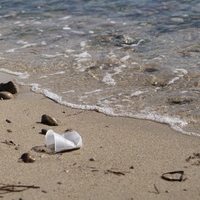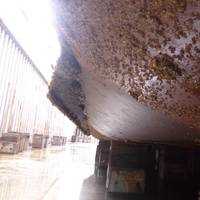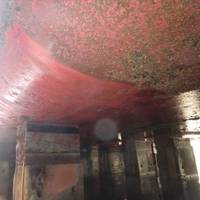Study: Sunlight Degrades Polystyrene Faster than Expected

A study published by researchers at Woods Hole Oceanographic Institution (WHOI) shows that polystyrene, one of the world’s most ubiquitous plastics, may degrade in decades or centuries when exposed to sunlight, rather than thousands of years as previously thought. The study published October 10, 2019, in the journal Environmental Science and Technology Letters.“Right now, policy makers generally assume that polystyrene lasts forever in the environment,” says Collin Ward, a marine chemist at WHOI and lead author of the study. “That’s part of justification for writing policy that bans it.
Selektope Antifouling in demand at Korean Shipyards
As global water temperatures increase, global ‘biofouling hotspots’ in subtropical/tropical areas are intensifying, exposing newbuildings at the world’s major shipyards to greater risk of hard fouling during the outfitting process. The effects of intense hard fouling on idle newbuilds can have great impact on a newly applied hull coating and on a vessel’s performance in sea trials. In response to this problem, a new antifouling coating specifically targeting hard biofouling prevention during the outfitting period was brought to market by Danish marine coatings specialist Hempel in late 2017. GLOBIC 9500S includes the unique antifouling…
New Selektope Powered Antifouling Launched

A brand-new antifouling product containing the bio-repellent ingredient Selektope has been launched onto the global market. The increasing diversification in the range of Selektope-containing products available to ship owners suitable for different vessel requirements demonstrates the unrivalled versatility of the antifouling ingredient. It also demonstrates a growing commitment to the technology as demand from ship owners for antifouling coatings comprising Selektope intensifies. SEA GRANDPRIX 880HS PLUS is the third product Chugoku Marine Paints (CMP) has launched that contains Selektope.
Selektope Enters Antifoulings Mainstream

The first branded marine coatings to feature the antifouling ingredient Selektope have been launched by coatings major Chugoku Marine Paints, Ltd. (CMP). Developed by I-TECH AB, Selektope’s pharmacological action is unique in the marine antifouling application. It repels barnacle settlement on ships’ hulls by temporarily stimulating the barnacle larvae’s swimming behavior. CMP’s new generation ‘SEAFLO NEO’ range of antifoulings make the Selektope solution available as a high performance product for mainstream operations…
I-Tech’s Selektope Approved in China

I-Tech informed that Selektope, a marine biocide used to improve ship hull performance and reduce maintenance, has been approved for use in China. Selektope has been approved for use as an antifouling biocide by the Ministry of Environmental Protection of the People’s Republic of China. “We are pleased to receive approval from the Chinese authorities of our antifouling technology following a rigorous environmental risk assessment,” said Philip Chaabane, Managing Director of I-Tech. Selektope has already been approved in Japan and South Korea and is under registration in the EU.
I-Tech to Supply CMP with New Biocide Anti-fouling Ingredient
I-Tech says it has entered into a non-exclusive supply agreement with Chugoku Marine Paints Ltd (CMP) for use of I-Tech’s proprietary product, Selektope, in commercial antifouling paints. Selektope is to be used as the principle biocide in new products to be brought to the market by CMP. The suppliers say that CMPs decision marks not only an important milestone for I-Tech but also sets the starting point for antifoulings containing a new selective biocide with a repellant mode of action and with minimal environmental footprint. Paints containing Selektope [prevent barnacles attaching to the hull] will be of particular value to customers in the marine industry.





